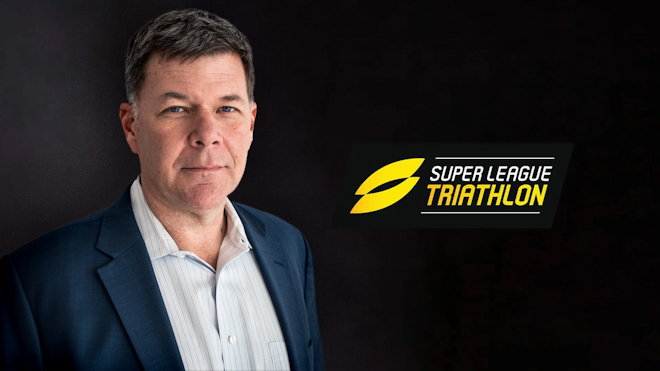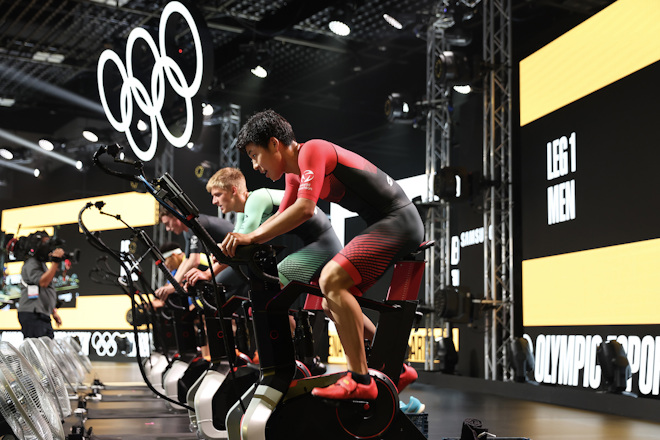“All athletes have an appetite to compete… It is in their blood, and to be denied that is tough.”
Chris McCormack, on creating the Super League Triathlon eSports Cycling Series
With the COVID-19 global pandemic suspending and cancelling most racing around the world, for athletes eSports racing has become important to fill the void of competition. Chris McCormack, founder of Super League Triathlon and CEO of MANA Group, explains the reasoning behind Super League Triathlon’s new eSports Cycling Series on Zwift.
“All athletes have an appetite to compete. Understanding and highlighting that is one thing, but delivering on it is critical. Motorsport have effectively filled their racing void with eSport Drivers Championships, creating a highly competitive environment.”
Previously, Super League Triathlon’s athletes competed among other teams and unknown riders on Zwift. McCormack comments, “Very obvious that many people can do amazing things on indoor trainers and the calibration of equipment might not be up to standard. Seeing 8-9 watts per kilogram put out by some amateur athletes sort of killed the relevance and the trust in the racing environment. It was watching this that pushed us to create our own series and set those frameworks for all competitors coming in.”
“High-performing athletes want to compete, and more so want to compete in a fair environment. I believe the Super League athletes are honorable enough as pros to be accurate with their weight, to calibrate their equipment correctly and get stuck in and race.”
Chris McCormack, on fairness in Virtual Racing competition
He says it was important for Super League Triathlon to set the framework, fairness, and foundations for competing. “High-performing athletes want to compete, and more so want to compete in a fair environment. I believe the Super League athletes are honorable enough as pros to be accurate with their weight, to calibrate their equipment correctly and get stuck in and race. They know each other well and the competition is valid. I think we will see a very different Series here and more so a different mindset to the athletes racing.”
Super League Triathlon’s eSports Cycling Series brings its athletes together into teams (France, USA, Australia, Great Britain) and some invited guest athletes. Each team will field four athletes to each of five races, with the combined times of their fastest two riders at each race counting toward the Team Classification Leaderboard. At each race, the top three athletes get prize money; athletes will also receive points for being the five fastest over sprints and KOMs/QOMs to rack up points for their team to win a cash bonus for taking the most points. There will also be an informal individual leaderboard ranking athletes’ points earned over sprints, KOM/QOM, and being in the top 10 across the finish line. At the end of the series, the big money is paid out to the top three teams on the Team Classification Leaderboard.
Offering a cash prize was important to elevate the level of competition. “Athletes are predictable creatures. Pin a number on them and make the event hold some financial significance, it most certainly changes the racing mood and mindset of athletes. They are naturally competitive people. They want to compete and that will kick in. Even if these athletes are out on the road with their squad they will race between town signs. Athletes race. It is in their blood, and to be denied that is tough.”
In working with the virtual platform to deliver more accurate and accountable racing for the pros, Super League Triathlon experienced some pushback at first. But thanks to their efforts, now many Tour de France teams such as INEOS and Bahrain McLaren are competing as teams against each other on the platform, and there are more structured and invitation-driven races that have turned a training tool into something that could deliver a racing environment.
While this was a necessary development in light of travel and movement restrictions around the world, McCormack believes eSports will not replace the sport. He says, “It is complementary to training and staying on top of things and gives an outlet to the athletes and some sort of normality during the season. It will find a place and can have a purpose. I just don’t think or want it to ever replace the real thing.”
However, athletes need to compete. Fierce competition, puddles of sweat, and the prospect of prize money are definitely tangible outcomes of the eSports Cycling Series for Super League Triathlon’s professional athletes. It may not be “the real thing”, but it will still be enjoyable and worthy of the effort involved.







